Answer these simple questions and we will find you the BEST prices
Which type of solar quotes do you need?
It only takes 30 seconds
100% free with no obligation

Get up to 4 quotes from our selected suppliers by filling in only 1 form

Save money by comparing quotes and choosing the most competitive offer

Our service is 100% free and with no obligation
- Market-Inspector.co.uk
- EPOS Systems
- Retail ePOS Systems
Retail POS: The 2024 Guide For Companies

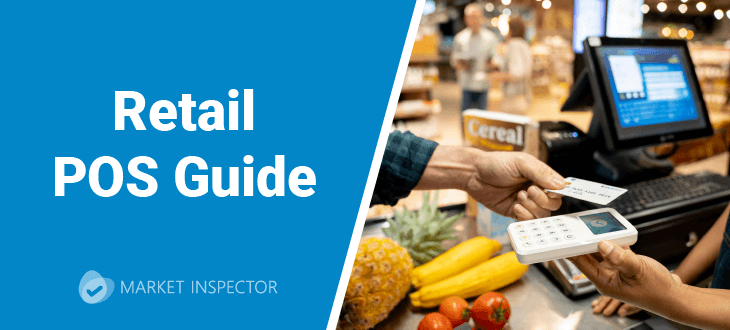
- Retail POS combines hardware and software that enables retailers to accept customer payments, updating the system to reflect accurate stock levels.
- The cost of a POS system can vary from £250 to £1,600 based on your business's specific requirements.
- By implementing a POS system, retailers can improve customer loyalty, reduce overstocking or understocking, succeed at omni-channel selling, and effectively manage employees and their performance.
A robust and efficient Point of Sale (POS) system is critical in today's fast-paced retail landscape. As we move forward into 2024, the advancements in POS technology are arming businesses with cutting-edge tools to streamline operations, enhance customer experiences, and drive profitability.
This comprehensive guide provides a deep dive into the latest trends and features of retail POS systems, offering invaluable insights into the various types available and their benefits. Whether you oversee a small boutique or a large retail chain, this guide will empower you to confidently navigate the complexities of selecting and implementing the optimal POS solution for your business.
From mobile POS systems to cloud-based solutions, we will unveil how the right technology can transform your retail operations, ensuring you maintain a competitive advantage in this dynamic market.
Our team of experts is dedicated to assisting you with a complimentary service tailored to your retail POS needs. Complete the form now by clicking to receive customised quotes free of charge and with no obligation.
- Describe your needs
- Get free quotes
- Choose the best offer
It only takes 30 seconds

What is a retail POS system?

A retail POS (point-of-sale) combines hardware and software that enables businesses to accept customer payments. When customers go to check out, online or in-store, the POS system also known as a retailers point processes their preferred payment method.
After the sale, the POS automatically updates inventory and allows businesses to track and manage their sales reports using the POS automation feature. The key features of a retail POS system is as follows:
- Processing payments: Allow customers to choose their preferred payment method whether it is credit/debit card, cash, contactless, digital wallets or plan to pay later.
- Manage inventory: Automatically updates stock levels after a sale, allows your business to track sales efficiently, facilitating order management saving money on over or under stocking as well as simplifying stock look up for staff members.
- Sales analytics: View real time sales data which assists in spotting trends and patterns. With accurate sales reports management of employee hours, store hours and inventory becomes efficient.
- Customer relationship management: Personalising shopper experience by tailoring marketing campaigns and promotions tailored to their purchasing history using data stored on a retail POS system.
- Omnichannel integration: Maximising sales and profits by allowing customers to purchase products online and in store. POS systems can support both and track sales and assist with payment methods.
- Employee management: Keeps track of employee productivity with such features as built-in time clocks, employee sales information and security management tools.
- Third party integration: Allowing other tools such as CRM, scheduling, accounting and loyalty program software to integrate seamlessly into the POS system so all the data is in one place.
Retail POS system cost
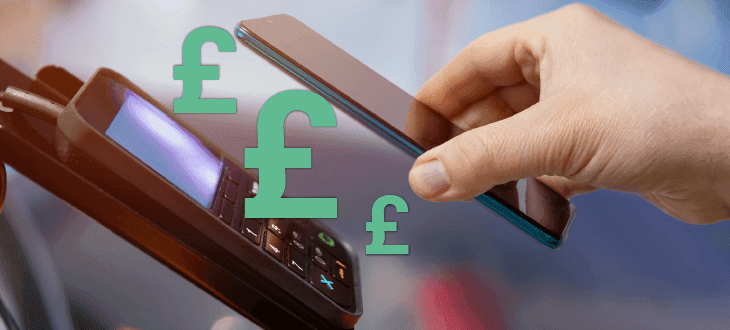
The cost of a retail POS system can vary depending on the quantity of hardware you require and your business's specific software needs. However, the cost typically ranges between £250 and £1,600, depending on your business's size and specific requirements.
According to Money.uk, the hardware for retail POS systems can range between £300 to £1,000 for a full POS system, which includes terminals, barcode scanners, and receipt printers. Different retail software providers offer various plans, such as basic, plus, and premium, each with different tools. Some software, like Square, offers essential tools for free for small companies, while other providers, such as Lightspeed, charge £89 per month for a basic subscription. It depends on your business needs to ensure sales growth and scalability.
Another significant cost for retail POS systems is transaction fees, which businesses must pay for every electronic customer transaction. Retail POS software providers have their transaction fees per plan. For instance, Square POS offers a free subscription, but their transaction fees are relatively high at 1.4% + 25p for UK cards and 2.5% + 25p for non-UK cards. It's essential to consider transaction fees when comparing different software solutions to ensure you get the best tools available at the right price for your budget.
Types of retail POS systems
Retail POS systems come in various types, each catering to different business needs and operational requirements. Which include the below:
- Traditional POS systems are hardware-intensive, typically featuring a cash register, barcode scanner, receipt printer, and card reader. They are ideal for brick-and-mortar stores requiring robust, stationary setups
- Mobile POS systems (mPOS) use portable devices like tablets or smartphones, enabling businesses to process transactions anywhere, which is perfect for businesses with limited space or those that operate on-the-go. Retailers are increasingly using mPOS to reduce queues in store, increasing customer satisfaction.
- Cloud-based POS systems store data online, offering the flexibility to access sales and inventory information from any location, which is particularly useful for businesses with multiple locations.
- All-in-one POS systems integrate hardware and software into a single unit, simplifying setup and maintenance, making them suitable for small to medium-sized businesses seeking ease of use and comprehensive functionality.
- Self-service kiosks are another type, allowing customers to place orders and make payments without cashier assistance, enhancing efficiency in high-traffic environments like fast-food restaurants or large retail stores.
Each type of POS system offers unique advantages tailored to specific business models, ensuring that retailers can choose the most appropriate solution to meet their operational needs.
Retail point of sale 2024 trends
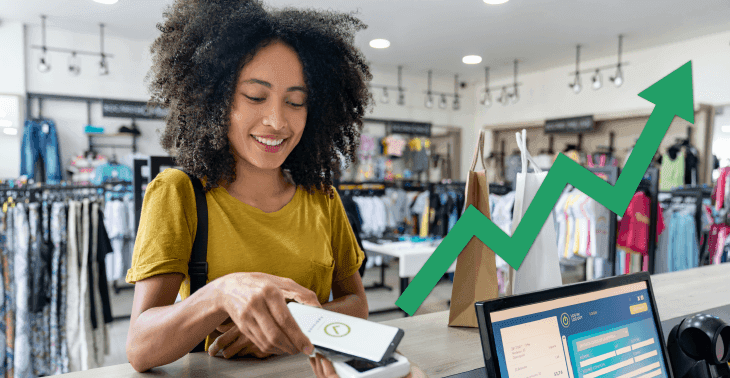
In 2024, retail point-of-sale (POS) systems are evolving to meet the demands of a dynamic market and tech-savvy consumers.
Key trends include the integration of artificial intelligence (AI) and machine learning to provide advanced data analytics and personalised customer experiences, enabling retailers to optimise inventory management and marketing strategies.
The rise of mobile POS (mPOS) systems is also significant. According to HoteltechReport, Nearly 1 in 4 people in the world will use mobile POS payments in 2023; the total number of users is on track to reach 1.9 billion this year. Mobile POS systems offer flexibility and improved customer service by allowing transactions to be processed anywhere within the store or on the go, making it ideal for pop-up shops and mobile businesses.
Cloud-based POS systems continue to gain traction due to their scalability, real-time data access, and ease of management across multiple locations. According to a 2018 Cisco study, 95% of businesses use some form of cloud-based software with the number likely to be higher in 2024.
The emphasis on omnichannel integration ensures a seamless customer experience across online and offline platforms, which is essential for businesses looking to unify their sales and inventory data.
Additionally, the adoption of contactless and mobile payments is expanding, driven by consumer preferences for faster and safer transactions. While 51% of consumers still prefer credit or debit cards, 19% are now using mobile payments. More customers are expecting retailers to offer multiple payment methods including POS financing or pay later plans. Using POS systems that can integrate with third party pay later apps can increase their sale order by 75% and some have reported to see a 756% increase in return of investment according to a Forrester study.
Lastly, sustainability is becoming a focus, with POS systems supporting digital receipts and eco-friendly business practices. POS systems that assist a brand with sustainability will help improve the brand image and save on costs by reducing waste. These trends highlight the need for retailers to adopt advanced, flexible, and customer-centric POS solutions to stay competitive in 2024
What are the best EPOS retail software features today?
Retail EPOS (Electronic Point of Sale) systems in 2024 are designed to cater to a wide range of business needs, from basic functionalities to advanced capabilities that enhance operational efficiency and customer experience. Below are some of the basic and advanced software features found in modern retail EPOS systems.
Basic Features
- Sales Transaction Processing: Handles the core task of processing sales, including scanning barcodes, calculating totals, and processing payments such as cash, card, and mobile transactions. According to Retail Customer Experience, 50% of customers would not return to a shop if they had to wait longer than 5 minutes in a queue. This basic feature of sales transactions helps streamline the checkout process, which is vital for customer satisfaction and ensures they will return to your store.
- Inventory Management: Tracks inventory levels in real time, updates stock quantities with each sale, and alerts when stock is low. 22% of customers said that they would not wait for an out-of-stock item to return to the shop and would seek it out in another store. Additionally, retail POS inventory management can help you save up to 10% by reducing inventory costs.
- Customer Relationship Management (CRM): Stores customer information and purchase histories and manages loyalty programs. This enhances customer engagement and retention through personalised marketing. Freshlime has reported that 56% of customers are likely to stay loyal to brands that understand their preferences.
- Stores customer information, purchase histories, and manages loyalty programs.This enhances customer engagement and retention through personalised marketing. Freshlime has reported that 56% of customers are likely to stay loyal to brands that understand their preferences.
- Basic Reporting and Analytics: Provides sales reports, basic performance metrics, and inventory reports. This offers insights into sales trends and business performance to inform decision-making.
- Employee Management: This feature tracks employee hours and sales performance and manages shift schedules. It allows your business to streamline payroll processes and helps manage your staff productivity.
Advanced Features
- AI and Machine Learning Integration: Utilises AI for advanced data analytics, predictive inventory management, and personalised customer recommendations. This feature optimises stock levels, enhances marketing strategies, and improves customer satisfaction through targeted promotions.
- Omnichannel Integration:Integrates online and offline sales channels, providing a unified view of inventory and sales data across all platforms. This ensures a seamless shopping experience for customers and simplifies inventory management.
- Advanced Security Features: Implements robust security measures, including end-to-end encryption, and tokenization. This protects sensitive customer data and reduces the risk of fraud.
- Advanced Reporting and Analytics: Offers detailed and customizable reports, predictive analytics, and insights into customer behaviour, sales trends, and operational efficiency. Which provides deep insights to drive strategic business decisions and improve overall performance.
- Mobile POS (mPOS) Capabilities: Supports transactions through mobile devices, allowing sales associates to process sales anywhere in the store or remotely which increases flexibility, improves customer service, and is ideal for mobile businesses like pop-up shops.
- Cloud-Based Functionality: Stores all data in the cloud, allowing access from any location and ensuring data synchronisation across multiple devices and locations. This feature enhances flexibility, scalability, and ensures that data is always up-to-date and accessible.
In 2024, retail EPOS systems will have basic and advanced features that cater to various business needs. The basic features ensure efficient sales processing, inventory management, and customer engagement. On the other hand, the advanced features leverage AI, omnichannel integration, enhanced security, and comprehensive analytics to drive business growth and improve customer experience. Choosing the right mix of these features depends on the specific needs and goals of the business.
EPOS and till system for retail
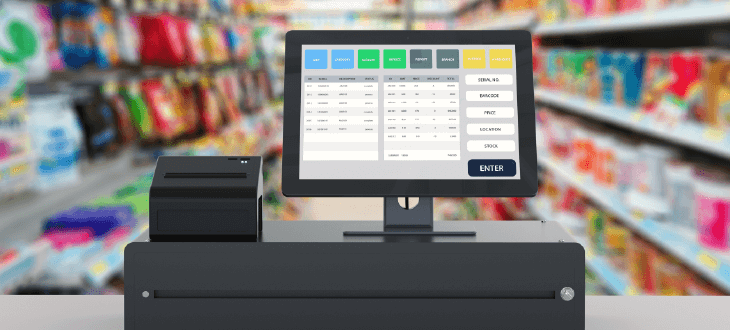
An EPOS (Electronic Point of Sale) and till system is essential for modern retail operations. It provides a comprehensive solution for managing sales, inventory, and customer interactions. These systems combine advanced software and hardware to streamline the checkout process, enhance operational efficiency, and improve the customer experience.
Retail EPOS systems incorporate sophisticated features designed to enhance operational efficiency, improve customer service, and provide valuable insights for better decision-making. Here are the best till system features for modern retail EPOS systems:
| Features of till system | Benefits |
|---|---|
| Real-time inventory management: | Tracks stock levels in real-time updates inventory with each sale and generates alerts for low-stock items. This prevents stockouts and overstock situations, ensuring optimal inventory levels and reducing |
| Integrated customer relationship management (CRM) | Stores customer data, purchase histories, and preferences and supports loyalty programs and personalised marketing. Enhances customer engagement and retention through targeted promotions and customised experiences. |
| Advanced reporting and analytics: | Provides detailed sales reports, employee performance metrics, and customer insights. Assists businesses in making data-driven decisions, optimising operations, and identifying trends and opportunities for growth. |
| Mobile POS capabilities: | Allows transactions to be processed on mobile devices such as tablets and smartphones. This enhances flexibility, reduces checkout lines, and is ideal for pop-up shops and events. |
| Omni-channel sales integration: | Integrates online and offline sales channels, providing a unified view of inventory and customer data. Ensures a seamless shopping experience and efficient inventory management across all sales platforms. |
| Contactless and mobile payments: | Supports a variety of payment methods, including NFC, mobile wallets (Apple Pay, Google Wallet), and EMV chip cards.Provides fast and secure transaction options, meeting the demand for contactless payments. |
| Employee management | Tracks employee hours, sales performance, and manages shift schedules.Streamlines payroll processing and helps in managing staff productivity and performance. |
| Cloud-based functionality | Stores data in the cloud, allowing access from any location and ensuring data synchronisation across multiple devices and locations. Enhances flexibility, scalability, and ensures that data is always up-to-date and accessible. |
| Security features | Implements advanced security measures, including end-to-end encryption, and tokenization. Protects sensitive customer data and reduces the risk of fraud. |
These features collectively make EPOS and till systems a vital component for any retail business aiming to improve efficiency and customer service while driving growth.
Payment accessibility and simplification
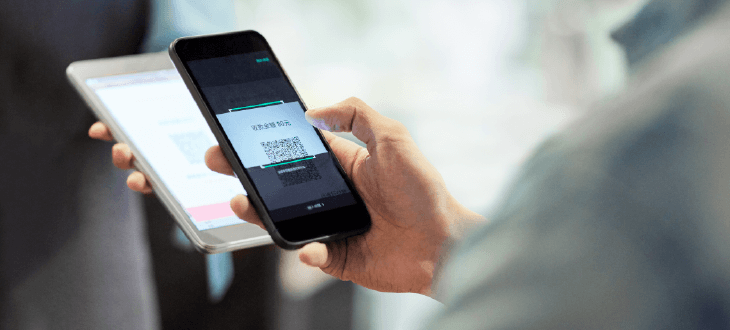
Retail point of sale (POS) systems are expertly crafted to efficiently manage all aspects of retail payment processing efficiently, significantly improving efficiency, security, and customer convenience.
Customers expect easy access to various in-store and online payment methods in today's fast-paced business environment. Here, we'll explore how EPOS systems in retail can help enhance accessibility and streamline the process.
- Multiple payment methods: Cash, debit/credit cards, contactless payments, and digital wallets, are accepted on retail POS systems.
- Contactless payment: Retail POS systems are designed to handle NFC (Near Field Communication) payments. Customers can tap their card or mobile device near the reader, which speeds up the checkout process and enhances safety by minimising physical contact.
- Integration with mobile payment: EPOS systems seamlessly integrate with mobile payment solutions, allowing retailers to accept payments through apps and digital wallets.
- Security: POS systems: incorporate advanced security measures such as end-to-end encryption and tokenization to protect sensitive payment information
- Detailed receipts: EPOS systems produce detailed digital or printed receipts that contain itemised lists of purchases, prices, taxes, and payment methods. These receipts offer customers clear and accurate records of their transactions and make returns and exchanges easy. Moreover, sending receipts digitally enhances a brand's image by providing a more sustainable option to customers.
EPOS systems confidently revolutionise payment processing in retail by seamlessly providing multiple payment options, enhancing security, enabling real-time processing, and seamlessly integrating with back-end systems.
These combined features significantly enhance the efficiency and accuracy of payment handling, ultimately leading to a superior customer experience and more streamlined operations.
Inventory and store management
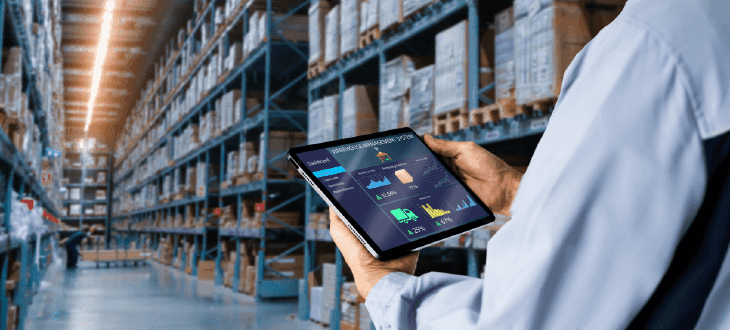
EPOS systems play a pivotal role in enhancing inventory and store management in retail, offering real-time tracking and automation capabilities that significantly improve efficiency. These systems ensure accurate inventory levels by automatically updating stock counts with each sale or return, effectively preventing stockouts and overstock situations.
EPOS systems also generate low-stock alerts and streamline reordering, helping retailers maintain optimal stock levels without manual intervention. By offering advanced analytics and reporting features, retailers can gain valuable insights into sales trends. This allows them to identify the items selling well and those not, enabling data-backed decisions regarding stock management and purchasing.
Furthermore, EPOS systems provide the ability to manage multiple store locations from a single platform, offering a comprehensive view of inventory across all outlets and warehouses. Integration with supply chain management systems further optimises the procurement process, reducing lead times and enhancing overall efficiency. These features significantly improve the accuracy, efficiency, and effectiveness of inventory and store management in the retail sector.
eCommerce and BOPIS

The popularity of online purchases and in-store pickup (BOPIS) is on the rise. Statista projects that retail e-commerce sales will exceed 6.3 trillion U.S. dollars globally in 2024, with further growth expected.
Although 68% of people still prefer shopping in person, it's crucial to leverage online shopping to boost sales and drive business growth. Retail POS systems sync online and in-store inventory in real-time, ensuring that customers see accurate stock levels when shopping online.
This helps avoid issues like overselling and improves inventory management efficiency. When a customer places an online order, the EPOS system updates the inventory instantly, providing a unified stock view across all sales channels.
For BOPIS, EPOS systems simplify the process by allowing customers to order online and pick up their items at their preferred store location. These systems handle the entire workflow, from order placement and inventory allocation to notifying customers when their orders are ready and providing tracking information. This integration enhances customer convenience by offering flexible shopping options and optimises inventory management while reducing order fulfilment times.
Additionally, EPOS systems offer detailed analytics and reporting on eCommerce and BOPIS transactions, enabling retailers to understand customer behaviour, improve stock management, and tailor their services accordingly.
POS systems for retail: features by category
Different retail categories, such as hardline, soft goods, and consumables, each have unique needs requiring specific POS system features to optimise their operations.
Each retail category benefits from specific POS features that cater to its unique operational needs, ensuring efficiency, customer satisfaction, and improved business performance. By leveraging the right features, retailers can optimise their operations and stay competitive in their respective markets.
Hardline retailer
Hardline retailers specialise in durable goods, such as electronics, home improvement and furniture, which typically have a longer sales cycle and higher value. The most relevant POS system features for this category include:
- Inventory management: Advanced inventory management to track large, diverse stock across multiple locations. This provides hardline retailers with accurate stock levels and efficient restocking, reducing the risk of overstock and stockouts.
- Sales reporting and analytics: Detailed sales and performance reports, including category-specific metrics. This helps hardline retailers create promotions and make data-based decisions.
- Work order management: This feature helps in managing custom orders, installations, or repairs, which are often associated with hardline retail. It facilitates and organises complex orders, speeding up the ordering process and reducing potential human error.
Soft good retailers
Soft goods retailers handle products with high turnover rates and seasonal variations, such as clothing, footwear, and accessories. Key POS features for this category include:
- Real-time inventory management: This feature allows retailers to track their inventory in real-time, as each sale and return is automatically updated on the POS system. It helps manage stock effectively, reducing stockouts and overstocking.
- Customer relationship management: This feature enables soft goods retailers to track customer purchasing history, enabling personalised marketing campaigns and promotions and facilitating loyalty programs for customers.
- Omnichannel integration: This feature involves integrating online and in-store channels to provide a seamless shopping experience and unified inventory management.
- Mobile POS capabilities: This feature allows retailers to process transactions on tablets and mobile devices, enhancing customer service by reducing checkout lines and offering personalised shopping assistance.
Consumables retailers
Consumables retailers deal with high-volume, low-margin items, so they need efficient transaction processing and inventory management systems. This category includes supermarkets and pharmacies. The key features of point of sale (POS) systems for this category are:
- Fast transaction processing: These systems must process sales transactions quickly and support multiple payment methods to reduce checkout times and improve customer satisfaction.
- Inventory and stock management: Real-time inventory tracking with automated restocking alerts and expiry date management to ensure product availability and minimise waste from expired goods.
- Customer loyalty programs: Retail POS software provides tools to implement and manage customer loyalty programs and promotions to encourage repeat purchases and build customer loyalty.
- Label printing and scanning: Integrated label printing and barcode scanning facilitate efficient stock management, speeding up the stocking process and improving inventory accuracy.
Advantages of retail EPOS systems

Retail EPOS (Electronic Point of Sale) systems offer numerous advantages that significantly enhance business operations and customer experience. One of the primary benefits is real-time inventory management, which instantly tracks stock levels and alerts when items need restocking, thereby reducing the risk of stockouts and overstock situations.
EPOS systems also streamline the checkout process by supporting multiple payment methods, including cash, card, and contactless payments, which speed up transactions and reduce wait times, enhancing customer satisfaction.
Additionally, integrating customer relationship management (CRM) features allows retailers to store customer data, track purchase histories, and implement personalised marketing strategies, fostering customer loyalty and repeat business.
Advanced reporting and analytics capabilities provide insights into sales trends, employee performance, and customer behaviours, enabling data-driven decision-making that can enhance operational efficiency and profitability.
Finally, cloud-based functionalities ensure data is accessible from anywhere, supporting businesses with multiple locations and facilitating remote management. These comprehensive features collectively make retail EPOS systems indispensable tools for modern retail businesses aiming to improve efficiency and customer service while driving growth.
Choosing the right retail POS system is essential for your business, impacting operational efficiency and customer satisfaction. With a wide variety of features and options available, seeking professional guidance to find a system that meets your needs is essential.
Market Inspector simplifies this process by offering four non-binding, free quotes tailored to your business's unique requirements. Complete our quick 30-second form to get these quotes promptly, saving you time and money. Click below to get started and make an informed decision for your retail POS system needs.
FAQ
A retail shop point of sale (POS) system combines hardware and software to process sales transactions, manage inventory, and streamline various business operations. It typically includes components like a touchscreen terminal, barcode scanner, receipt printer, and card reader, facilitating efficient checkout and comprehensive sales data and inventory management.
A retailer point, commonly referred to as a point of sale (POS), is the location where a retail transaction is completed. It is the point at which the customer makes a payment to the retailer in exchange for goods or services.
EPOS in retail stands for Electronic Point of Sale, a system that combines hardware and software to manage sales transactions and streamline business operations. It includes components such as a touchscreen terminal, barcode scanner, receipt printer, and card reader, with the software managing sales processing, inventory tracking, customer data, and real-time sales reporting.
The best POS system for retail is one with advanced features, including inventory management, sales transaction processing, including accepting a variety of payment methods, customer relationship management, sales and analytic reporting, and employee management.

Caoimhe is an experienced content writer and researcher who is passionate about providing accessible information to every reader. With a background in English literature and Sociology, she combines the two disciplines to create cohesive, well-thought-out, and well-informed pieces.
We strive to connect our customers with the right product and supplier. Would you like to be part of Market Inspector?

